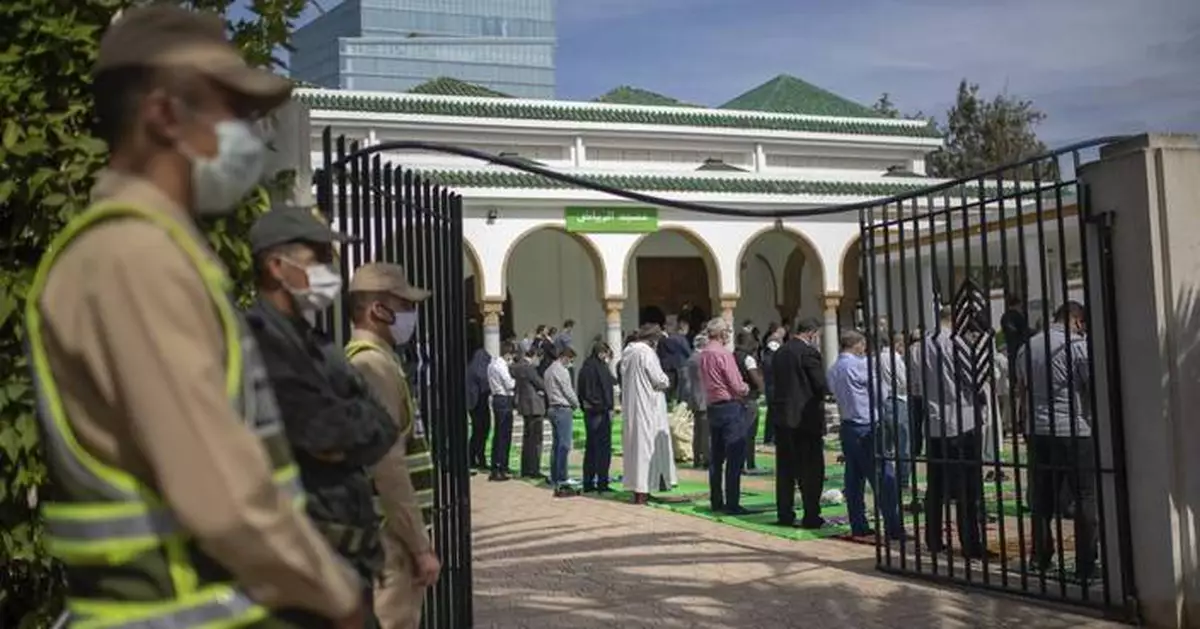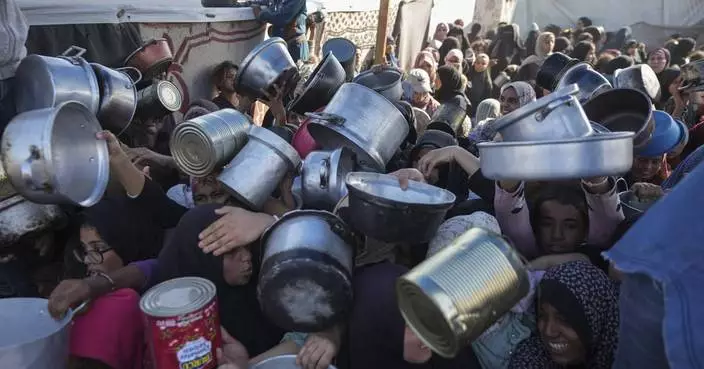RABAT, Morocco (AP) — Politicians and activists in Morocco are questioning limitations imposed on preachers regarding what they may say about war in the Middle East during sermons.
During a meeting at the country's parliament this week, socialist lawmaker Nabila Mounib bemoaned the way that imams were curtailed in how they can speak about the plight of Palestinians and call for religious struggle to support their cause.
“No imam can speak about the Palestinian issue,” Mounib claimed on Tuesday. “Today no one is demanding jihad for our brothers in Palestine.”
In Morocco, imams are employed by the state and their sermons cannot be overtly political. Regardless of the extent to which they have focused on the Israel-Hamas war, Morocco’s Ministry of Islamic Affairs has said that such subject matter is permitted. Yet activists are still worried about de facto limits placed on preaching about Palestinians.
The question first arose in October 2023 after a document circulated on social media claiming to outline such limits. Morocco's Ministry of Islamic Affairs said in a statement that preaching about the suffering of Palestinians was authorized and that the document was faked.
In an interview with Moroccan news website Anfas Press on Friday, Mounib said she had intended to denounce efforts to prevent imams from preaching about Palestinians but had not said they should call for jihad from their pulpits.
“Jihad,” which means struggle or effort in Arabic, can denote striving to live in accordance with the path of God, either through internally finding one’s faith or externally fighting for Islamic principles like justice. However, it can be interpreted in more militant terms as “holy war” and has been used by some as a religious concept used to recruit volunteers to fight since the Soviet-Afghan war began in 1979.
The debate centers on whether it should be allowed to invoke jihad in regard to the war between Israel and Hamas.
Minister of Islamic Affairs Ahmed Toufiq later denied Mounib’s claim that preachers cannot broach the Israel-Hamas war but acknowledged and defended the prohibition on calls for jihad.
“Any imam who talks about barbarism and injustice and denounces them is welcome, but calling for jihad is something else,” he said.
Explaining the prohibition this week, Toufiq cautioned that there were different interpretations of jihad.
Yet to some pro-Palestinian activists in Morocco, the limitations are less about jihad and more about the tensions between state and society that have simmered since the war began.
“Imams have a right to take a stand and, in Islam, even have a duty,” Ahmed Wehman of the Moroccan Observatory for Anti-Normalization told The Associated Press. “The government has nothing to do with Moroccan public opinion. They do not represent Morocco and Moroccans.”
Morocco has one of the region’s most historically significant Jewish communities and was one of four Arab states to normalize ties with Israel in 2020. But tens of thousands of protesters have regularly taken to the streets of its major cities throughout the 14-month war, protesting Israel’s actions and demanding Morocco cut diplomatic ties.
Protests have united socialists like Mounib with Islamists, including those from the Justice and Development Party and Al Adl Wal Ihsane, a banned but tolerated Islamist movement that doesn’t participate in electoral politics. Some of its members have faced arrest and imprisonment for opining on social media about Morocco's ties with Israel amid the war.
Many governments dictate what preachers can say from the pulpit in Muslim-majority countries, including Morocco, which has long worked to describe its brand of Islam to the world as a moderating force. Doing so is among authorities’ strategies to curb extremism but can at times push believers to look for spiritual guidance outside the government-controlled religious sphere.
Francesco Cavatorta, a political science professor at Université Laval in Quebec, said countries like Morocco, Algeria, Egypt and Syria have historically exerted control over imams to control the narrative of religion and ensure sermons don't undermine national stability.
In Morocco, he said, the regulation is “part of an effort to be seen as a country that is a Muslim country but a tolerant country and a welcoming country.”
Morocco has this year suspended preachers who veer from directives. Its Ministry of Islamic Affairs publishes guidance for imams on Wednesdays, two days before Friday prayers.
The content of sermons has in the past pitted the government against activists. In 2017, when anti-government protests were sweeping Morocco’s north, the Ministry of Islamic Affairs directed preachers to reproach activists for promoting division among Muslims, the online news outlet Le Desk reported. Nasser Zefzafi, the country’s most famous political prisoner, was arrested later that year after interrupting a sermon about the protests, shouting a question about whether mosques served God or the monarchy.
Morocco's Ministry of Islamic Affairs did not respond to requests for comment.
Imams throughout the Middle East and North Africa have regularly referenced the war since October 2023, including in countries where the government oversees their sermons.
“The way to eliminate oppression and evil, no matter where it is in the world, is through the unity and solidarity of Muslims,” Ali Erbas, the head of the Turkish Presidency of Religious Affairs, said in a Friday sermon delivered in Azerbaijan. ”When Muslims act together with the consciousness of brotherhood and the spirit of solidarity, all people will find peace."
Associated Press writers Akram Oubachir in Casablanca, Morocco and Suzan Fraser in Ankara, Turkey contributed to this report.
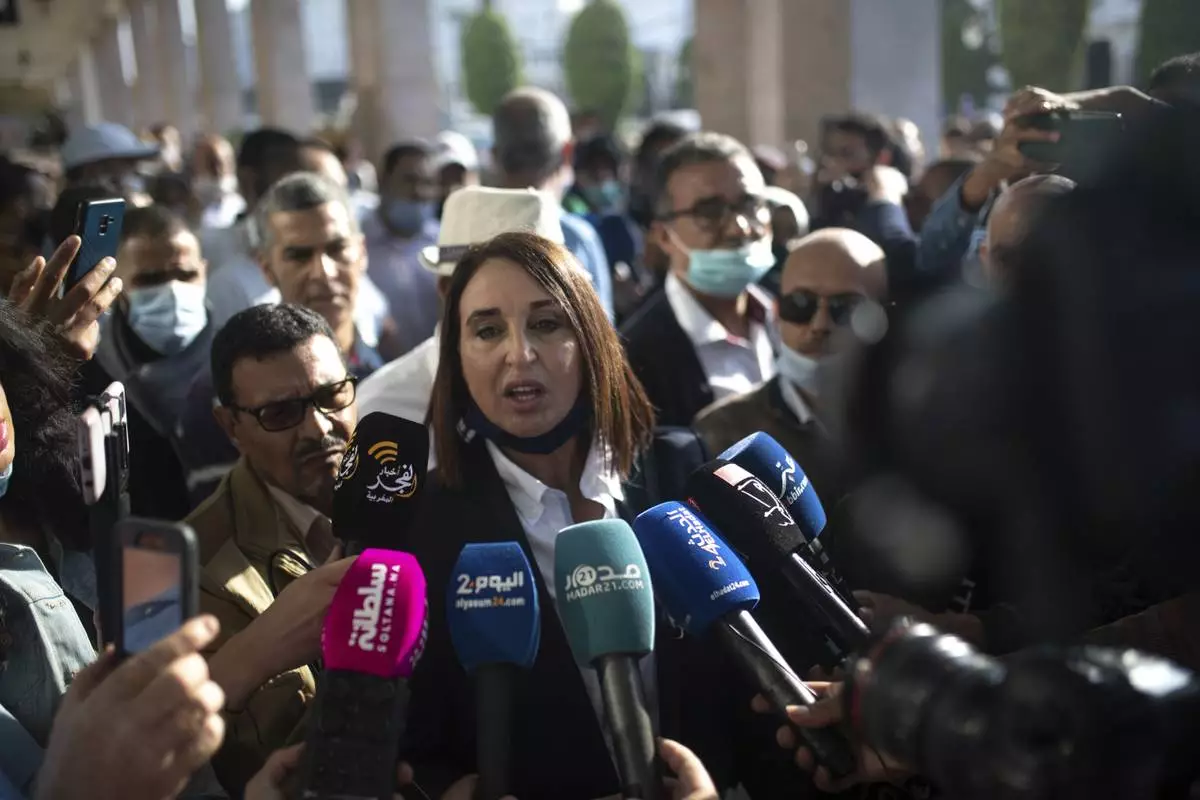
FILE - Parliament member Nabila Mounib speaks to the press during a protest against the government enforcing of a mandatory COVID-19 vaccine pass to access public places and travel, in Rabat, Morocco, Wednesday, Oct. 27, 2021. (AP Photo/Mosa'ab Elshamy, File)
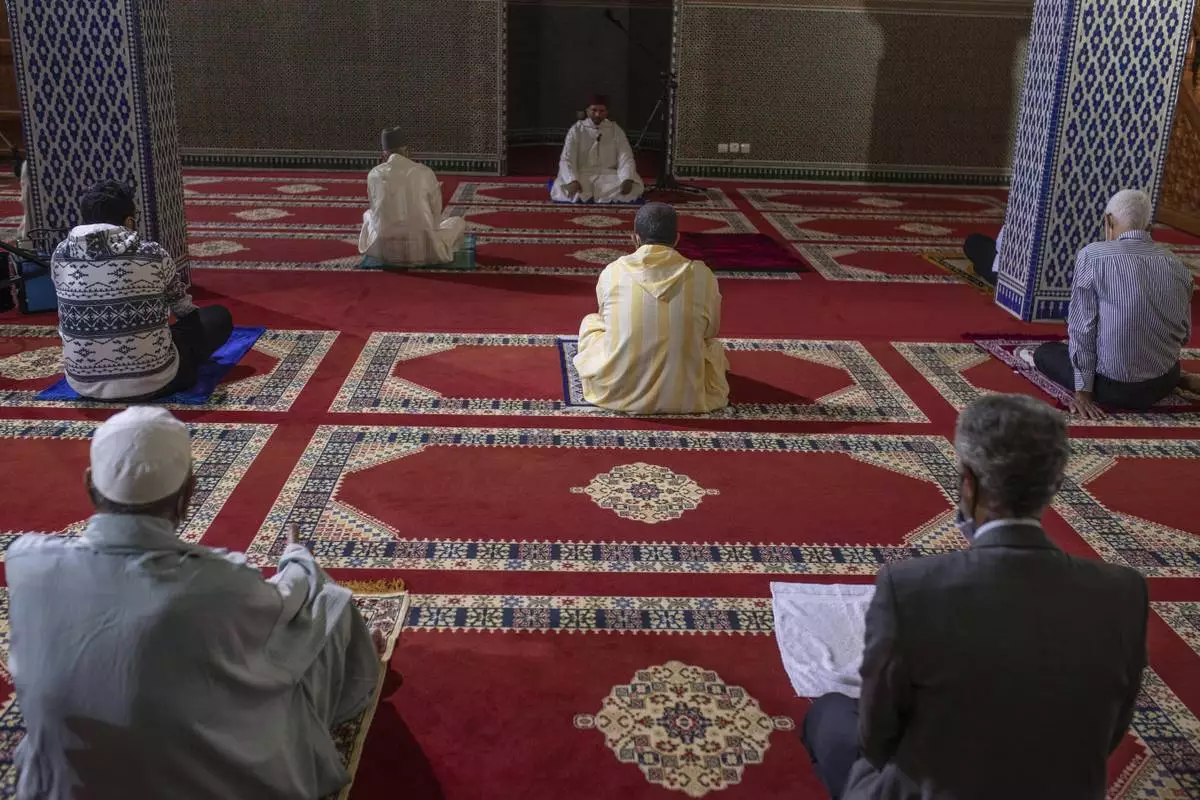
FILE - Muslim worshippers observe social distancing inside a mosque during Friday prayers in Rabat, Morocco, Friday, Oct. 16, 2020. For the first time since the outbreak of coronavirus in March, Morocco has allowed mosques to reopen for Friday prayers. (AP Photo/Mosa'ab Elshamy, File)
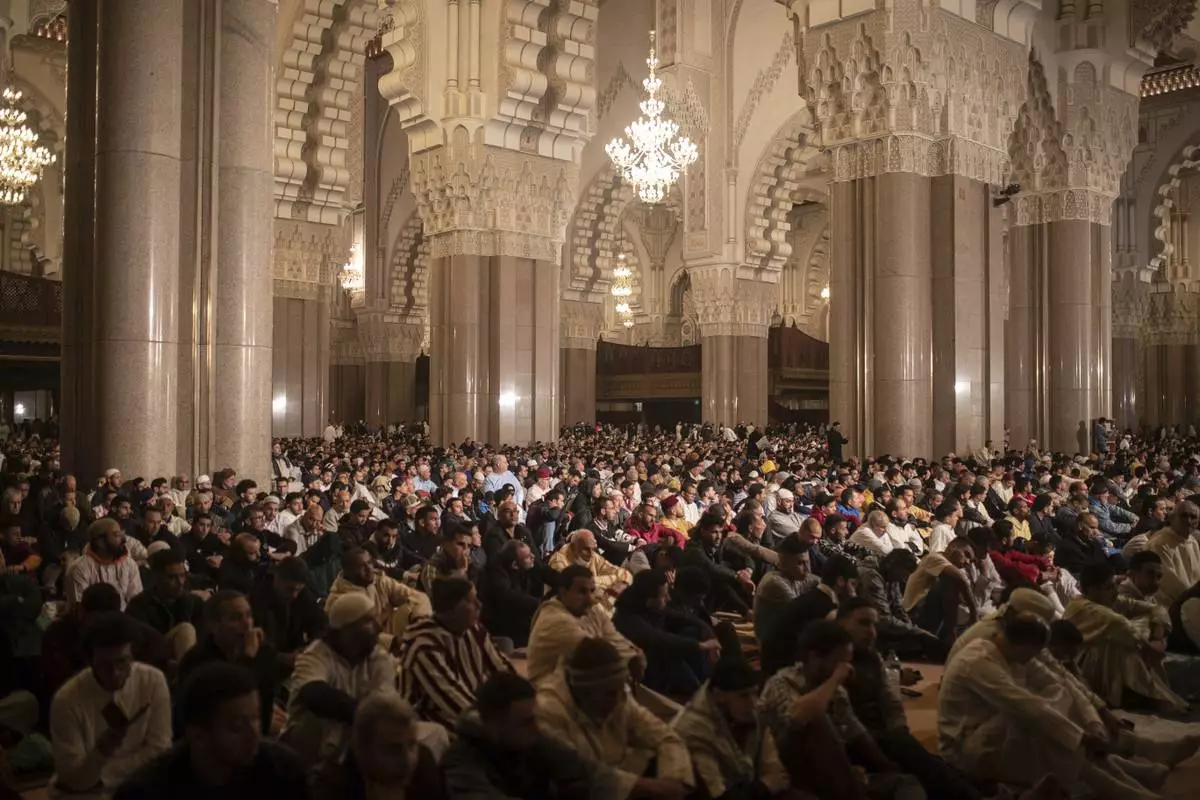
FILE - Worshippers gather to perform night prayers on the eve of Laylat-al-Qadr or Night of Power marking the 27th and holiest night of Islamic fasting month of Ramadan in Hassan II mosque in Casablanca, Morocco, Thursday, April 28, 2022. (AP Photo/Mosa'ab Elshamy, File)
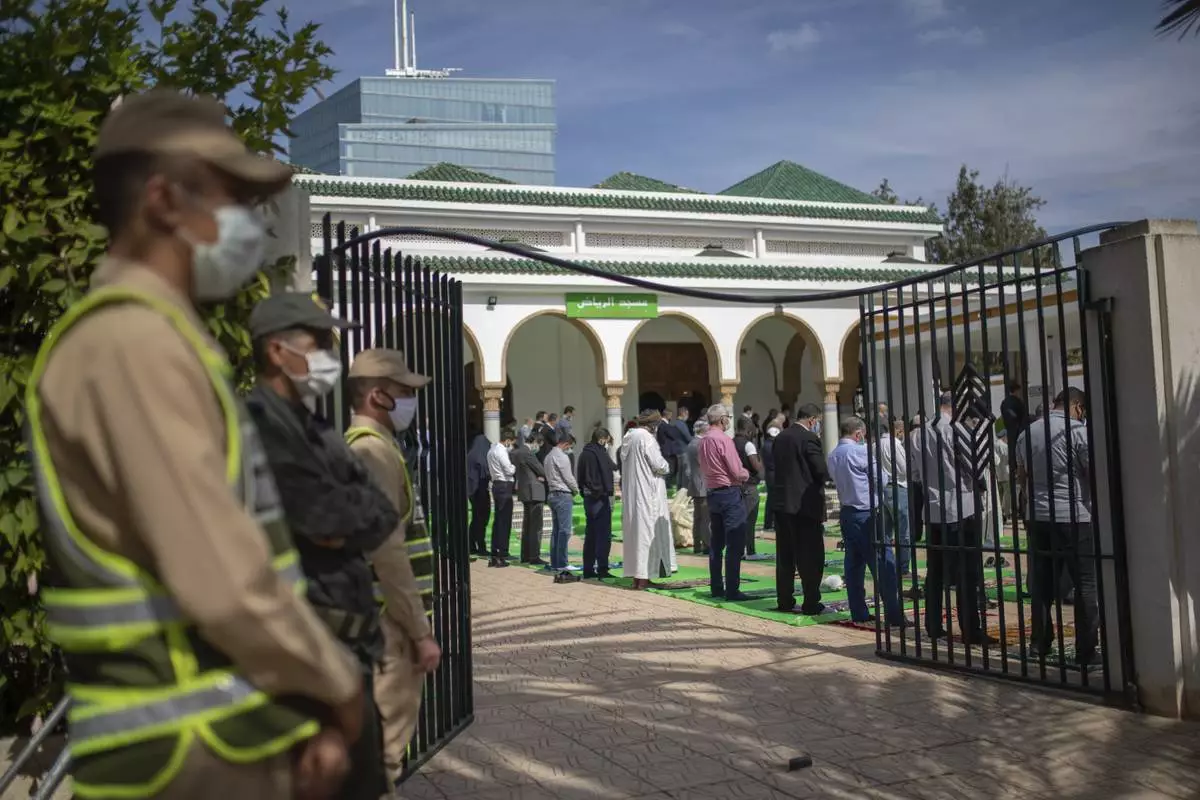
FILE - A member of security forces stands guard while Muslim worshippers queue to enter a mosque for Friday prayers in Rabat, Morocco, Friday, Oct. 16, 2020. (AP Photo/Mosa'ab Elshamy, File)


